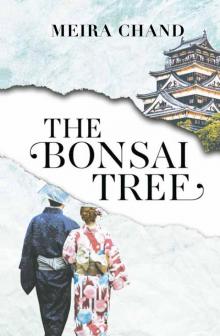- Home
- Meira Chand
The Gossamer Fly Page 2
The Gossamer Fly Read online
Page 2
‘Come, Hiroko.’ Frances Akazawa inclined her head.
Hiroko moved forward, following her out of the door. The room was suddenly silent, the walls seemed to breathe once more, the window loomed up to prominence again. Natsuko was left alone. But on her arm the flesh, released, smarted like a burn.
2
It came again as it had the night before, at eleven-thirty. The thin, high wail of a pipe, slicing the darkness and silence. She awoke, knowing it had been, listening for it to come again. The notes warbled lightly downwards, mournful over the bay. Then it was there near the house, ending in a sigh. As the note died the sound hung on, amputated, hovering in darkness above her bed. Pulling the warmth of the quilts about her Natsuko pushed down, covering her head. It was difficult to breathe and her ears were still alive, straining and waiting. Drilling into the padding it came again, slipping through the cold night glass of the window to touch her.
Throwing back the covers then, she ran out of the room, down the dark passage. A draught blew up her nightdress between her legs, contracting her skin to goose-pimples. The bare boards of the corridor numbed her feet. It did not help to know it was only the recorded pipe music played by a noodle cart, wheeling a late night round through the streets.
Under Riichi’s door was a slither of light. It was always here she ran, when she woke in the night. Not her parents’ room, where her father sent her sternly back to bed, sometimes walking her there himself, his pyjamas crumpled, his hair twisted into peaks, his voice firm, tolerating no cowardly thoughts. He never allowed her mother to come: ‘No, Frances, I will take her. She must learn.’ His voice lumped them together, she and her mother, in an area of inadequacy and self indulgence. But Riichi told nobody and allowed her into the warmth of his bed, if the dreams were too bad.
Wanting to cry out in relief she opened the door and saw Riichi, standing just inside, before a long mirror on the wall, lost in a world of fantasy. He was naked to the waist. Around the top of his underpants he wore the wide knitted stomach warmer their father sometimes used in winter. An unhemmed cotton kitchen cloth, folded to a slim white band, was tied about his head, in the manner of old samurai when they pledged to fight until death. His hands swung high above his head, clutching the long slim body of a sword. Through the knitted belt the bony arc of his diaphragm cut up into his chest.
Afterwards she remembered his arms coming down towards her slowly. But she knew this was only in her mind, for she heard the swish of metal as the sword cut through the air. On her arm its touch was light. She felt nothing but a coldness before the smarting began. Looking down she saw the fine, red line of blood, and seeing shock on Riichi’s face, began to cry.
‘It’s nothing. Only a scratch. Don’t cry. You’ll wake them all up.’ Riichi pulled her to the bed and began wrapping the wound in the cotton headband, winding it tightly round her arm, tucking the end in the top. It was broad and white on her arm, blue printed Chinese characters on it advertised beer. She remembered a delivery boy with crates of bottles handing the cloth over the gate as a customary New Year present. Now, through the prongs of thick square Chinese writing she saw the first smear of blood break through.
‘It’s nothing. It will dry up in a moment,’ Riichi said again. He was sliding the sword back into the scabbard. With a blunt click she heard it lock into place. The sword was the longest of five hanging on the wall in their father’s study. The scabbard was glossy and black, antique and valuable. She had never seen it off the wall. Its background was the thick beige slub of the wallpaper, a soiled mark under the supporting bracket. It merged and belonged there. Against the bare flesh of Riichi’s thigh the blade looked evil.
‘You’re not allowed to touch them.’ She shivered.
‘Father said they’ll be mine one day.’ His face was suddenly stubborn. He assumed this expression all the time now, since he became seventeen, using it often on his mother. For, against the wishes of Frances Akazawa he now learnt kendo, the ancient fencing art. She acquiesced only because in place of a sword, a long slim wooden pole was used. She had a horror of all weapons.
Soon after Riichi started Natsuko had gone one evening with her parents, to the fencing academy to watch. They were impressed by the large hall and the rows of boys, facing each other, in traditional dark blue kimono trousers. Meshed faces and hard lacquered breast plates made them look like trousered ants. Frances Akazawa smiled, pointing to Riichi. But when the boys launched into free combat, lunging at each other, stick meeting stick, her expression withdrew. For the hall was then filled with the flailing of sticks, one upon another. A terrible thrashing sound echoing up to the glass roof of the gymnasium, falling down upon them again. It did not stop. Hands over ears, Frances dropped her head to her lap with a moan, her body limp and trembling. They helped her out, one on each side of her, and drove home in silence.
From the back seat Natsuko watched the line of her mother’s cheek. Occasionally it flinched as a passing headlight beamed into the car. On her father’s face was the same expression she saw when she woke at night, his mouth tight, his eyes impatient. She sat looking from one parent’s profile to the other, the outlines, lost in darkness would suddenly flare up, caught by passing light. Worry made a tight ball in Natsuko’s belly. In the car, silence was trampled and bruised about her mother. Once, half way home, Frances turned her face a little, looking at Kazuo.
‘I can’t help it. It was the noise. I cannot stand a noise like that any longer.’ Her voice was pinched and pleading.
But looking ahead over the steering wheel Kazuo only nodded. Silently, Frances examined his impassive profile, and then slumped back.
‘I just don’t know what is the matter with me any more.
Forgive me please.’ Her voice was tired, Kazuo nodded again. At home Frances Akazawa went straight to bed.
Now, seeing the sword in Riichi’s hand Natsuko remembered her mother’s terror, and felt it touch her also. Quickly, she pulled her feet up into Riichi’s bed, beneath the thick eiderdown, patterned with stripes and fans. Sometimes, when she came to Riichi’s room like this, running down the passage in the dark, he did not even wake, just grunted and turned over. And the warmth, the nearness of his body, the strange male smell of his bed, different from her own, comforted. But now she felt only the soreness on her arm, and held it tightly over the bandage. She knew she had intruded, Riichi did not want her here.
‘Don’t tell anyone.’ He threatened, leaning over her on the bed. ‘It’s only a small scratch. I did not know you would rush in like that.’
Above the beige stomach belt his nipples stared at her reproachfully. Natsuko thought then of the other time he had threatened her with the same words.
It had been three months before, on New Year’s Eve. On that day each year their father insisted they go at midnight to the big Shinto shrine in the town. As they approached they heard the drums from streets away, booming rhythmically out. It was past midnight, the gates were already open and two huge bonfires alight in the courtyard. High on the parapet of the ornate roofed gate the four drums were floodlit. Each had two drummers, naked but for loincloths and short happi coats. In the frozen night air they sweated, their skin glazed, attacking the drums again and again.
Flares, bonfires and electric light flooded the shrine. People overflowed up the steps and around the huge bell rope. Pushing their way through the crowd they reached the massive swinging rope, and with both hands shook it in turn, disturbing the bell at the top, the sound rumbling up the gods. They bowed, threw coins in the offering box, and dispatched the gods back by a clapping of hands. Then Kazuo led them to the inner shrine. It was quiet and empty there. Side by side they sat on stools. Behind, through open wooden arches, the crowd was a moving swell, contained by a light barrier. The clink of coins and the dull rattle of the bell played steadily under the beat of drums. In heavy brocade robes a priest purified them by waving a wand of hemp and paper streamers. With a high pitched cry he called down the gods once again, t
o partake of a ceremonial meal on the altar, of rice cakes, sake wine and fruit. Kazuo laid a twig of sacred tree on the altar, and with another cry the gods were sent back.
Between her mother and Riichi, Natsuko waited, for the cup of rice wine the priest would give them at the end. Looking down her nose, she watched her breath freeze, and tear away from her into the night. Beside her, on a high pole to the right hung a brocade banner, a long flowing strip of cloth, reaching almost to the ground. It billowed gently in the breeze. She took no notice until the wind, in a sudden rush, blew down between the tall red arches of the shrine. Then the banner writhed about, twisting up to her, touching her gently on the arm once before it dropped back. It blew up again and she saw it, coming flatly at her. The faded, whirling pattern of chrysanthemums in threadbare golds, oranges and greens weaved about before her. Then, with a soft slap, it enveloped her face. On her mouth she tasted metallic thread and the weathered, musty cloth, smelling of incense and rain. As she tugged, trying to free her face, the wind wrapped it tighter about her. She screamed out. And instantly it was gone, dropping away, tamed and quiet in the priest’s hand. Shaking his wand of paper bits, he secured it to the pole again. But even after the rice wine, in its shallow red lacquer cup, the taste of old cloth remained on her tongue. The feel of it, mummified about her face, lasted for days. She knew then, no good could come of the year.
Walking down the steps, through the jostling crowds, they reached again the courtyard below. Here shrine shops were open, selling horoscopes, good omens and ornamental arrows of luck. Small trees in the courtyard were decorated by a shower of horoscope predictions, left folded and tied in neat bows among leaves. The trees looked bloated but dignified and festive. The courtyard was brighter than day, blazing with illumination, deep shadows puckering the edges, the sky black and empty above. They stood on the top of more sheer steps, looking down on the narrow streets leading to the shrine. They were lined by stalls draped in red and white bunting, where trinkets, toffee apples, roasted chestnuts, grilled squid and candy floss were sold. There were games to catch goldfish and shoot wooden ducks. Between this lighted border of stalls was the slow movement of hundreds of heads, like a dark, sluggish river. Above, breath and smoke froze in clouds on the midnight air. There was a smell everywhere of broiled octopus, fish and charcoal.
Leaving their parents at the horoscopes, Natsuko and Riichi went down into it all, hand in hand. First they bought batter cakes in the shape of fish, filled with sweet purple bean paste, then toffee apples. Biting through the cold brittle glaze, crunching it with their teeth, and stamping their feet to keep warm, they walked on. It had begun to snow. Looking up into the black hole of a sky, Natsuko saw the flakes, lighted from below, spinning down upon them like feathers emptied from a bag.
It was then they found the marquee. It was erected triangularly, across the corner of a parking lot, backed by a wall. Above the tent large pictures in magenta, blue and green showed the elongated white faces and enormous wigs of geisha women, in the manner of old woodblock prints. Stuck across paltry wooden slats the thin paper bulged with the breeze, in places the faces were ripped open. Spilling from a generator box, wire coiled over the pavement to two arc lamps, blazing on both sides of the tent. Near the entrance a short fat man in a red ski jacket, shouted into the microphone, announcing the next performance. People disgorged through the flap of the tent from the last show, a smell of beer breaking from them. A man turned to the wall beside Natsuko, to urinate. A liquid arc spurted from him, the warmth of it rising in steam. He turned and she saw him then, hard and straight as a stick between the buttons.
Pulling her with him, Riichi walked round to the side of the tent. Against the wall there, high up, was a slim gap in the canvas that Riichi was tall enough to look through. Pressing his knee to the wall, his foot resting on a rough crack, he pulled Natsuko up onto his leg. Half clinging to the top of the wall, half sitting on Riichi’s knee, she was able to see through the slit.
The view was not clear, they were behind tiered stands of seats. At first ankles and shoes were all she saw. Then, in gaps between trouser legs, appeared part of a rough wooden stage, raised up high on stilts. On the ground below were the painted white lines of parking spaces. A woman knelt at the side of the stage, grey haired and dressed in a sombre patterned kimono. With a white paddle-shaped plectrum she was twanging the strings of a samisen, held upon her lap. At the first pause another woman came out on to the stage, standing still and posed at the centre. She was the long white face outside, on the pictures above the tent ripped by the wind, the same tiny eyes, the pagoda of hair. She was the face Natsuko remembered in her grandmother’s house, from old Kabuki programmes stored in a trunk and looked over on rainy days. At home she stared out of old prints and her father’s scholarly books, bathing, loving, collecting fireflies and powdering her neck. Now, on the creaking stage above white parking lines, she began to dance. Slowly, sedately, her limbs moved, her body turned. The greens and reds of her kimono dipped and swayed. At the back of her neck it dropped low, showing a white fall of skin. The stiff lacquered coils and loops of the wig were twisted with bands of silk, stuck with red pins and hanging silver ornaments. Below her face was a floury white, half erasing her lips to a bright tiny bud. The samisen twanged, she raised an arm, the long sleeves swung as she moved precisely across the stage and back.
Sitting on Riichi’s knee, Natsuko no longer felt the wind chilling the side of her face, or the narrow discomfort of Riichi’s thigh. The past, dead among mothballs and old paper, took on new shape. She sat forward, intense.
But the face, bland and stately until now, began to crack open. A coarse smile filled the white paint. The movement of the hands had suddenly nothing to do with the rhythm of the samisen. They were pulling awkwardly at the stiff folds of the obi sash. Natsuko saw it begin to untie, rolling away like string from a parcel, as the woman pulled it from her, yard after yard. It dropped and lay on the stage, stretched out in a crumpled, goldworked snake. She danced on, her face splintering lewdly. Her eyes rolled, her tongue licked her lips, sneaky and hungry. And suddenly the kimono dropped, a soft gaudy mass at her feet. After it, one by one, the under kimono fell in pastel heaps, almond, white and pink. The last was pink again, and Natsuko saw there was nothing more. The woman stood still a moment, a slit of skin to her waist, a swell of breast beneath. Then, slowly, she withdrew her arms, until the top slipped down about the tie at her waist. A rustle spread through the tent. On the wooden stands feet uncrossed and recrossed.
The pictures of old prints were lost, the Kabuki programmes gone. In her stomach Natsuko felt a quickening. But the breasts were disappointing, not the expected fleshiness, just flat, with a boniness across the top. The woman moved nearer, and Natsuko saw goose pimples on her upper arms. In the cold her nipples were contracted and small, the skin puckered tightly about them. She grinned again, showing two gold-teeth.
Overwhelmingly then it repulsed her. Curiosity gone, it was all grotesque and horrible. The thin twig of a body, and above it the head with its huge, elaborate black wig. It was the head of a fly she had once seen magnified, shiny and bulbously coiled. And where the woman’s neck joined her backbone, three long points of white paint separated her head from the flesh below. The music twanged on, Natsuko waited, knowing what must come.
But Riichi lowered his knee then, forgetting her, and she slipped, falling awkwardly to the pavement. He was standing right up against the canvas now, under his jeans the muscle of his thigh was hard and tense. She pulled at his jacket, but his body was fixed, he took no notice of her. She leaned back against the wall and waited, feeling unnecessary and small. Her bare fingers hurt with cold, she retrieved her gloves from the pocket of her coat, and pulled them on. Inside the tent the samisen twanged. The notes came to her, separate and slightly off key. Then abruptly the music stopped. And beside her Riichi took a sharp breath, like a sob.
Afterwards he took her fiercely by the shoulders and said, ‘Don’t t
ell anyone.’
Now she felt the same angry feeling warm in her as on that New Year’s Eve. Pushing down and away from Riichi she buried under his quilt, hating the soreness on her arm, and the throbbing discomfort of rage. Suddenly, all around her there were wide spaces, silence and uncertainty. She could no longer be sure about Riichi. He seemed to be slipping away down a long tunnel. His outline was no longer clear. He said and did things now that fitted no known context. She was sure only of being alone, where Riichi had stood with her before. But she promised as she had the other time, for he could still intimidate her.
‘No. I won’t tell.’
Turning her eyes away she looked beyond the flat nipples of his chest, under his armpit with its soft, new hair, across the sea of stripes and fans. She saw it then, in a corner of the room, sitting on the floor below the window. The worn toy bear of Riichi’s, that she too had played with. Riichi had used it for his sword practice. It was slashed in the face, through the black wool of its nose. Frayed and parted strands stood up, like whiskers around the bald open tip. And below, its belly was all cut about. White stuffing spewed out in a solid lump. Fear started up inside her then.
Seeing her looking at the bear Riichi, saying nothing, took a paper bag from the drawer of his desk. Tipping out the few matchboxes it contained, he stuffed the bear inside, rolled it up and pushed it into the wastepaper basket. But under the paper, the bulge of the bear’s head peered over the top. Putting out the light, he got into bed.
Suddenly then, Natsuko did not want to stay, and ran back again into her own room, and tucked down deeply in bed. On her arm Riichi’s bandage moved against the soreness. She knew she would not sleep. In the dark well beneath the covers, she saw again the white mound of stuffing against the belly of the bear. And on her arm was the constant smarting of the thin sliced line through her flesh. She lay staring at the ceiling, hovering darkly above, and prayed for sleep to come.

 The Bonsai Tree
The Bonsai Tree A Choice of Evils
A Choice of Evils Last Quadrant
Last Quadrant Sacred Waters
Sacred Waters The Gossamer Fly
The Gossamer Fly The Painted Cage
The Painted Cage House of the Sun
House of the Sun